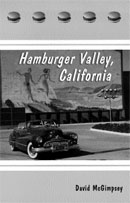
Hamburger Valley, California
David Mcgimpsey
ECW Press
$15.95
paper
104pp
1-55022-456-5
In “O Porco Mio,” a self-satire on his own expanding waistline, the poet pictures himself on a sofa watching television, distracted from the natural world of “weed eating goats,” “manta-ray skimming the sea floor,” and the “crappie” fish. These are things which should stereotypically concern a poet, but his thoughts have turned instead to squandering his scholarship money on the “greatest Sasquatch hoax of our time.” More than simply funny, the poem mischievously suggests poetry has only an iota of the power to move the public that a convincing Sasquatch hoax does.
The overriding tone of this collection is something like a sustained giggle, a smirk and rolling of the eyes. Beneath most of the verse you sense the glee of a poet-cum-frat boy whose artistry is always a little in danger of being dominated by his love of slapstick. Some of Hamburger’s poems are indeed little more than literate limericks, but McGimpsey is also a gifted poet, and many inclusions, like “Museum Street,” are also finely crafted satire:
The Coca-Cola Museum in Atlanta
With its hordes of gassy
Hyperactive children
Is of no worse order or design
Than the Musee des beaux-arts in Montreal.
Then in the last stanza, McGimpsey delivers a sucker punch to the placated middle class.
En pleine air,
Sugary thick dusk,
Shapeless in XXL T-shirts,
All the regrets of slipping into the middle class
Now worn like favourite slippers.
What makes this sanctimony tolerable is that the poet envisions himself among the coke-guzzling hordes. There is no other way to explain the last third of Hamburger Valley, which McGimpsey reserves for a series of poems that involve him eating symbolic hamburgers. The metaphor is obvious but effective in “The Hamburger Song”:
But I had to get something to eat,
Preferably something in a bun,
And even the cancerous heat lamps
Wouldn’t stop me from having more than one.
The food lady said it would take a second
But I said, “I want it faster you old hag.”…
His appetite is impatient, demandingly urgent, but luckily he is on a continent where that is both encouraged and easily accommodated. McGimpsey the poet has no problem with uncontrollable desire-no real poet would-but it is rather unchained appetites which fail to create anything but more intense hunger that are under suspicion here.
Hamburger Valley is not an attack on American culture but a lighthearted reproach against the cultural emptiness and human laziness which has allowed it to develop. At the same time, though, and occasionally with real poignancy, McGimpsey laments that popular culture just isn’t enough to satisfy the human soul, that it only manages to fill your stomach. mRb






0 Comments